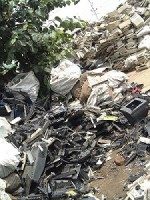The town of Guiyu was the dumping ground for US e-waste, but has now made a recovery.
Postguam.com reported that for over 10 years, Lai Yun, an environmental activist, visited the town and saw the result of e-waste on the air, while the river was also blackened by toxins. Lai photographed the e-waste mountains and the workers that went through the waste by hand to recycle it. Returning in 2015 to Guiyu, Lai hardly recognised the town as it was so clean and said that it “looks like it’s better”.
He recognised that “looks can be deceiving” and that the story of the town spans decades, with a history of Chinese prosperity that carried the cost of widespread pollution, which in itself inspired him to work for Greenpeace, where he started to “investigate the international trade of electronic waste”. The Recycler reported onJim Puckett and BAN’s quest to track down where US e- waste ended up, using tracker devices hidden in printers.
Instead of US recyclers dealing with the waste, they shipped it to other countries that did not have the same health and safety laws, violating a 1989 treaty called the Basel Convention, which bars “the trade of hazardous waste across international borders”. Puckett started the watchdog organisation Basel Action Network (BAN) to “help enforce the Basel Convention”, as the US never signed up to the treaty, and is the world’s largest producer of e-waste.
It was in 2001 that Puckett and his team found the “epicentre of the smuggling operations in Guiyu”. he, Lai and other environmentalists convinced Western media to take note, but exposure was not always welcomed by the very people that they were trying to help, because they felt that their livelihoods were being threatened – even though their health could suffer more from lead, mercury and cadmium poisoning,
Shan Shan Chung, a biology professor at Hong Kong Baptist University, said that “those workers, they come from poor areas, so they only focus on their short-term survival. When you are really poor, you don’t care what will happen to you several years down the road”. After 14 years of being palmed off by authorities, Puckett found that in December 2015 the e-waste disappeared almost overnight from the streets of Guiyu.
The local government had “issued an ultimatum, ordering all e-waste businesses to relocate to an industrial park on the edge of town. Failure to comply would result in punishment, including steep fines”. All incoming cargo was inspected at the industrial park, and forbidden electronics were “weeded out”, sending a clear message.
Puckett said that “I believe that finally that message filtered down to the state level and to the local level”, but when he and Lai returned for a visit they found “dirty practices inside the industrial park” and Lai commented that “the business in this industrial park looks like the same, uses the same technology, uses the same methodology. So I think it’s a pity. It’s not a real upgrade”.
Few workers wore gloves or masks, and the same “acrid smell filled the air” as they ripped old computers apart by hand. One worker said she earns the equivalent of $600 (€566), 10 times as much as a waitress, and the park now deals “exclusively with e-waste produced in China”, which is set to “overtake the US as the biggest electronics consumer”.
E-waste trade now goes to different parts of China as well as Pakistan and Mexico, and Greenpeace shut down its campaign in China – instead there is another environmental organisation focussing on the education of children. Puckett said that Guiyu’s environmental problems are not over and that “it will take centuries for it to clean itself up”.